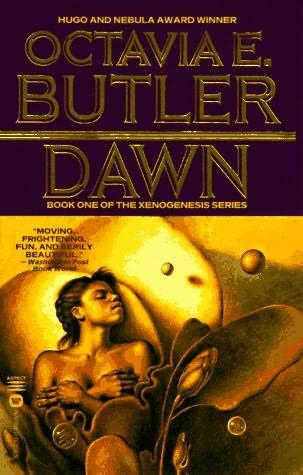Alien Beginnings
 I'm prefacing this with a reminder that I don't write reviews often or particularly well. I don't even like writing them, as I tend to drive myself insane while deciding how much information to include. But sometimes I come across a book series, movie, or TV show that truly ensnares me, and I figuratively jump up and down with excitement and the desire to share it. Octavia Butler's Xenogenesis is one such book series.
I'm prefacing this with a reminder that I don't write reviews often or particularly well. I don't even like writing them, as I tend to drive myself insane while deciding how much information to include. But sometimes I come across a book series, movie, or TV show that truly ensnares me, and I figuratively jump up and down with excitement and the desire to share it. Octavia Butler's Xenogenesis is one such book series.
Earth and humanity are on the brink of destruction, brought on by intense nuclear warring among humans. To forestall this doom, an advanced alien species called the Oankali steps in and rescues the humans. But there's a disturbing caveat, one that will change humans as we know them forever. In the first novel, Dawn, we meet a very important woman named Lilith Iyapo. She's one of the humans rescued by the Oankali, but their so-called charity was driven by ulterior motives, and when Lilith learns of them, she's horrified. However, if both species are to survive, she must overcome her fears and revulsion and cooperate with the Oankali. This brings us to the second novel, Adulthood Rites, which is written in the first-person point-of-view of Akin, one of Lilith's offspring. But he's no ordinary child. As he matures from baby to adult, the readers join him in his (mis)adventures, hurdling with him every obstacle he faces. Finally, Imago jumps ahead a couple generations--still in Lilith's line, but this time from the point-of-view of Jodahs, a new characters who's the first of its kind. No, that's not a typo; I meant to say "its," instead of "his" or "her." A strange distinction, perhaps, but an incredibly important one.
I've read some fascinating science-fiction novels--including some strange ones (Gaea, Well World)--and Butler's trilogy earns a spot as one of the most exceptional I've read. She takes a common theme--Earth's destruction, post-apocalyptic humanity--and infuses it with the Oankali and their unique evolutionary past, present, and future. It's very easy to identify with Butler's characters. You fight the Oankali as hard as they do; you experience their anger and sorrow at the Oankali's actions; and you slowly begin to accept the Oankali, and even like them in the end. At least that was my journey. I really hated the Oankali initially, but when I got to know some of them--especially the ooloi--I couldn't help but like them. However, I still feel a bit guilty, like I'm somehow betraying the human species. Oh well.
What I love most about the Xenogenesis series is Butler's flawless story-telling. She weaves an irresistible tale that, despite its many disturbing elements, leaves you wanting more. Each novel is paced perfectly. The first novel introduces the Oankali but is careful not to scare off the reader. When readers reach the second novel, they're comfortable enough with the Oankali for Butler to throw a few genetic curveballs at them. And finally, by the third novel, the concepts that initially unnerved readers are accepted, enabling them to embrace a new, even more alien species than the Oankali. Well played, Ms. Butler.
So if you're looking for a captivating read that will take you on an emotional, moral, and intellectual rollercoaster, give Xenogenesis a try. I can't recommend it enough.






